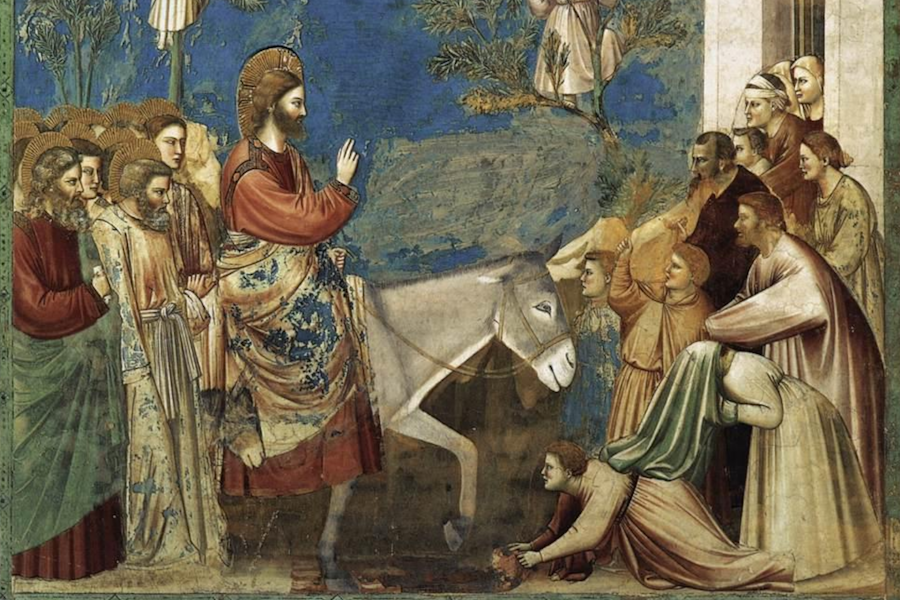In John 13, Jesus the Messiah washes His disciples’ feet and then, in the next chapter, gives them His longest recorded set of instructions. After sharing all sorts of directives and revelations, He looks at those He loves dearly, the ones who have left their lives and families to follow Him, and says, “Peace I leave with you; my peace I give you. I do not give to you as the world gives. Do not let your hearts be troubled and do not be afraid.”
In the very last hours of His life, knowing that He will soon face death, undeserved punishment, cruel torture, Jesus is concerned with His disciples’ hearts. My mind and my body cannot be free from anxiety until I fix my heart on Him. “Do not let your hearts be troubled,” Jesus says, and I confess: My heart is all too often troubled, and I know that yours is too.
“My peace I give you,” Jesus tells His disciples. But look a bit earlier in the passage or at the verses right after and we see that Jesus is describing His impending death and warning His disciples of all manner of terrible things that are going to happen to them. He has warned them of their own sin and shortcomings and all the persecution and difficulty they are about to face. He says, “I have told you these things, so that in me you may have peace. In this world you will have trouble. But take heart! I have overcome the world.”
Take heart? John doesn’t record the disciples’ response here, but I know what mine would have been. Jesus has just told them that He is going to be betrayed and killed — that He is “going away.” They have given up their entire lives to follow Him, and He is going to leave? My reaction would have been to panic, but He instructs His disciples to grab hold of the opposite: deep peace and assurance.
Jesus isn’t telling them to take heart because it will be easy. The disciples aren’t looking forward to a moment of quiet or a beach vacation, the absence of chaos or trial or the perfect circumstances. They don’t have success, financial freedom, or quiet lives to look forward to. They— we— are to take heart because Jesus, whose peace is not of this world, has overcome this world. There is no chaos or trial or circumstance that does not bow to Him. There is no hardship that we cannot trust Him with. “I am with you always,” He says. As our circumstances change, He does not. This is reason to rest. This is reason to rejoice. This is reason for peace.
We are thirsty for His peace, His deep rest, soul rest that remains true regardless of our circumstances. And we cannot find this peace in the world or in our outward circumstances. This peace can only be found in the person of Jesus Christ, the Prince of Peace, who meets us in our turmoil, who is unchanged by the chaos of our world or the fluctuation of our emotions.
We find peace only in Jesus Himself because He is the only constant. He is the only one who doesn’t change. He is the only one we can count on. Over and over in Scripture, Jesus offers people peace, blesses people with peace, and instructs them to “Go in peace.”
So we have this promise. Now what? How do we actually experience peace without just glossing over struggle and hardship with Christian platitudes?
Jesus points at our hearts: “Let not your hearts be troubled.” So often, I am looking for peace in the external— my circumstance, my location, my life season, my absence of emergencies or interruptions — but the shift I need is internal. It is my heart that needs to be steadied, that needs to be changed.
I want a peace that permeates my life and flows out of it. I want a peace that settles down over my heart so that even as the world around me is pulled apart, my thoughts and emotions are fixed on a constant savior, a sure eternity, and a certainty that we are safe in His hands. I want to be able to breathe deeply and keep my bouncing knee and my fidgeting fingers still because I know that Jesus is in the boat with me, no matter the storm I am facing. As I attune my heart to His, I can have a peace that transcends all circumstance, that overcomes the world.
A study of the word peace Jesus uses in His final instructions to the disciples reveals the Old Testament Hebrew word shalom. While in a few cases this word could be used to mean “at rest” or “quiet,” which is what comes to mind for me first when I think of peace, much more often it is used to mean “deliverance” or “salvation.”
I spent some time letting that sink in after I first read Jesus’s word to the disciples. When He says, “My peace I give you,” He— our deliverance and salvation— is also saying, I will be with you. He is Immanuel, God with us. He is with us in the rapids. He is with us in the boat. Peace is ours because our deliverance and salvation come from Him. He Himself is our peace.
Excerpted from SAFE ALL ALONG: Trading Our Fears and Anxieties for God’s Unshakable Peace © 2023 by Katie Davis Majors. Published by Multnomah, an imprint of Random House, a division of Penguin Random House LLC, on March 28, 2023.
Image: Fresco by Giotto di Bondone, The Entry into Jerusalem, between 1304 and 1306. Scrovegni Chapel, Padua Italy. Public domain, via Wikimedia Commons
Text First Published March 2023 · Last Featured on Renovare.org March 2023


